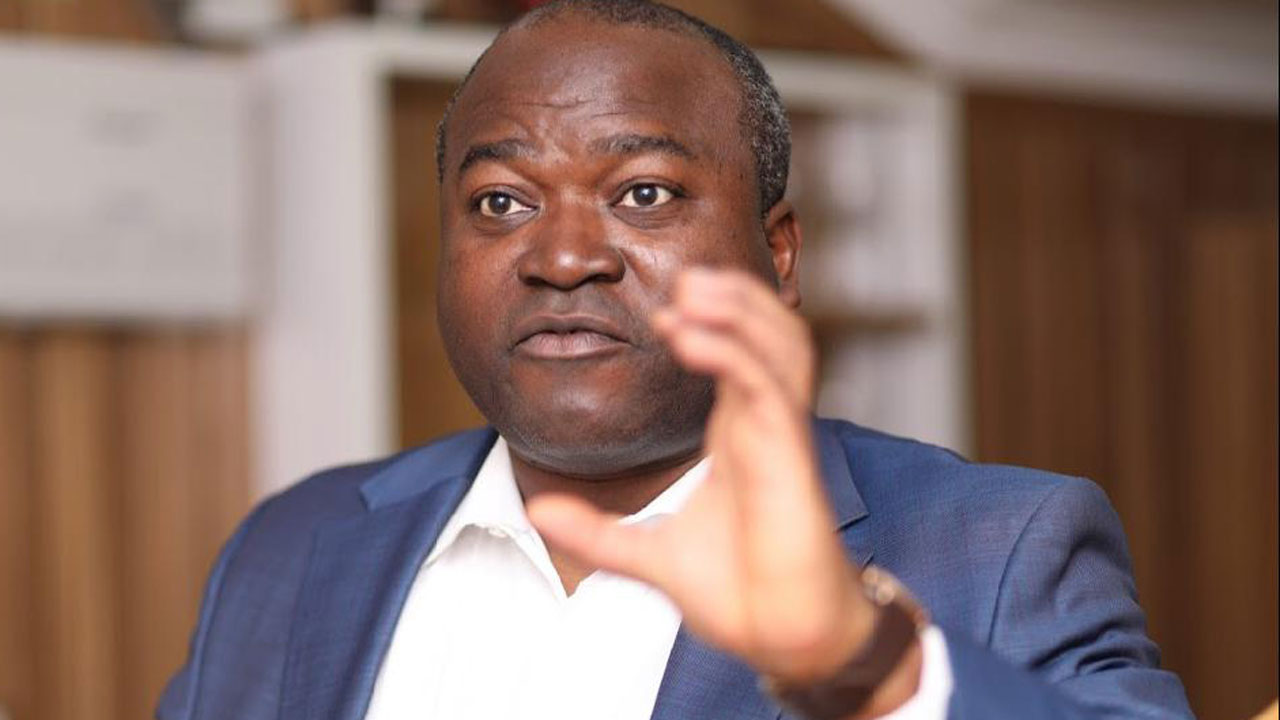Metro
How Lagos Accountant Burnt Wife, Brother-in-Law Alive

The Lagos State Police Command, on Thursday, paraded a chartered accountant, identified as Benjamin, for allegedly setting his wife, Chinyere, and brother-in-law, Ifeanyi, ablaze in the Abule Ado area of the state.
PUNCH Metro gathered that Chinyere and Ifeanyi were at a guest house in the couple’s residence when Benjamin allegedly set them on fire.
After perpetrating the crime, the suspect allegedly locked the duo in the guest house and went to call for help.
A source told our correspondent that Ifeanyi’s dying declaration implicated him.
The source said, “His brother-in-law was a contract worker at Chevron. He was also the only son of the family. He didn’t die immediately; he made a dying declaration that Benjamin opened the door while he and his sister, Chinyere, who was Benjamin’s wife, were in the guest house, poured petrol on them, set them ablaze and locked them inside.
“Ifeanyi struggled to come outside, but the woman couldn’t. Benjamin ran outside and started shouting that fire was burning. There may be some underlying reasons for him to have done that. The house he stays in belonged to his wife and she wanted to sell it because she heard he wanted to sell the house without her consent.
“There was also a case of jealousy because he said when his wife returned from Scotland, she kept talking to someone on the phone despite cautioning her against it, and the whole thing accumulated.
“The wife had relocated to Scotland with their children. Their children are still in Scotland; he has thrown the children into jeopardy with this incident.”
Speaking on behalf of the state Commissioner of Police, Abiodun Alabi, the state Police Public Relations Officer, SP Benjamin Hundeyin, while parading the suspect at the command’s headquarters in Ikeja, said the victim’s husband set her and her brother ablaze after a minor quarrel.
He said, “This deals with a case of the murder of one Chinyere and Ifeanyi by Chinyere’s husband, Benjamin, at Abule-Ado, Lagos State, on April 1, 2022, around 3.30am. The victims were set ablaze by Benjamin after a minor quarrel. The suspect will soon be charged to court.”
The suspect, however, denied setting his wife and in-law ablaze, adding that he also sustained burns during the incident.
He said, “My wife returned from Scotland and used her Nigerian number to call me around 9pm to open the gate. I was not at home, but I told my tenant, Stanley, to help me open the gate. I also left what I was doing and rushed home. I never knew she came with her brother until I got home.
“So, after assisting in parking some of her loads, we moved into the bedroom and started talking as husband and wife. Suddenly, she received a call and told me the call concerned her brother and she needed to be with him to receive it.
“I agreed and she left the room to meet her brother at the guest house. While she was still at the guest house, I went to take a bottle of drink at a place close to our house. After I was done, I went home, and entered our room, thinking my wife would be inside, but she was not there and was still in the guest room discussing with her brother.
“I left her there, went to the parlour and switched on the television. But later on, I saw an unusual fire coming from the direction they were and as I moved closer, I saw smoke. But as I opened the door, I saw fire and screamed. I sustained burns also. I moved out and started shouting for help; I also asked a woman to pour water on me and that was the last thing I remembered as I woke up in a hospital.”
Metro
Safer Lagos: LSSTF Boss Ogunsan Sets Agenda for 2026, Thanks Donors, Corporate Partners

The Lagos State Security Trust Fund (LSSTF) has opened the year with a strong message of appreciation and renewed partnership, commending its donors and corporate partners for their extraordinary commitment to the security and stability of Lagos State throughout 2025, National Association of Online Security News Publishers (NAOSNP) can report.
In a New Year statement he personally signed and issued on behalf of Governor Babajide Olusola Sanwo-Olu, the Board of Trustees, Management, and staff of the Fund, the Executive Secretary/CEO of LSSTF, Dr. Ayodele Ogunsan, praised donors for going beyond financial contributions to demonstrate trust, shared responsibility, and a deep belief in collective security.
Your contributions, Ogunsan observed, ‘over the past year represented far more than financial support. They reflected trust, shared responsibility, and a collective commitment to safeguarding lives, property, and the economic vitality of Lagos State. With your partnership, the Fund was able to strengthen the capacity of security agencies, enhance operational effectiveness, and respond meaningfully to evolving security needs across the State.’
The Governor deeply values the enduring partnership between the public and private sectors as a model of how collaborative security funding can deliver measurable impact, not only for Lagos which is Nigeria’s commercial nerve centre and West Africa’s economic hub, but for the nation as a whole.
Looking ahead to 2026, the Fund expressed optimism about consolidating gains recorded in the past year, deepening strategic partnerships, and welcoming new donors who share its vision of a secure, resilient, and investor-friendly Lagos State. ‘As we step into 2026, we look forward with optimism – building on the progress achieved, deepening existing partnerships, and welcoming new donors and
partners who share our vision for a secure and resilient Lagos State.’
With emerging security realities demanding innovation and sustained support, LSSTF said continued collaboration will be key to staying ahead of threats. ‘We are confident that, together, we can sustain the gains recorded and respond effectively to emerging security challenges in the year ahead,’ Ogunsan concluded.
Metro
Anthony Joshua: FRSC Zonal Commander Visits Accident Scene, Urges Caution

Following the fatal crash on the Lagos–Ibadan Expressway in Ogun State involving world-renowned boxer, Anthony Joshua and his team, the Zonal Commanding Officer (ZCO) of the FRSC RS2 Lagos Zone, Assistant Corps Marshal, ACM Ann O. Oladayo, on Tuesday conducted an on-the-spot assessment of the accident scene, even as the incident has generated widespread public interest and conflicting reports, the National Association of Online Security News Publishers (NAOSNP), can report
Speaking with pressmen during the assessment visit, ACM Oladayo said the inspection was necessary to establish the true facts, noting that some FRSC operatives were already present at the corridor when the crash occurred yesterday. “A lot of reports are out there, but we decided to come for an eyewitness account because some of our operatives were here when it happened. We needed to ascertain what actually occurred,” she said.
According to the FRSC, preliminary findings from eyewitnesses revealed that a trailer conveying soya beans was properly parked off the road, waiting to be offloaded, when a speeding vehicle conveying popular international boxing champion, Anthony Joshua and his friends ran into it. “From what we gathered, the truck was not on the road. It was waiting to be offloaded and was well off the carriageway when the vehicle ran into it,” Oladayo explained.
She dismissed claims that the FRSC failed to respond promptly, stressing that the Corps arrived at the scene within minutes. “Immediately we heard of the incident, we were here in under three minutes. Our priority was rescue. Unfortunately, we lost two lives, but the injured were rescued and taken for medical attention,” she said.
The Zonal Commander added that suspected over-speeding and possible wrongful overtaking were being investigated as likely causes of the crash, noting that the impact force which pulled out the trailer’s tyres suggested excessive speed. “On this highway, the speed limit is 100km/h. From the impact, it is likely that the vehicle exceeded that limit. Investigation is still ongoing,” she stated.
An eyewitness, Yusuf Ajala Oluwaseun, who was at the scene when the crash occurred, blamed persistent speeding along the highway. “We just heard a loud boom. At first, we thought it was a tyre burst. People overspeed a lot on this road. Just last week, an 18-seater bus speeding here hit a man and overturned. FRSC came and rescued the victims,” he said.
Another eyewitness, Sodiq Ayo, confirmed the swift arrival of emergency responders of FRSC and described the moments after the crash. “I heard a sound and came out. People were shouting that someone was still inside the Jeep. When we realised it was Anthony Joshua, everyone gathered, a lot of people were doing video of Anthony Joshua. But before people arrived fully, FRSC came and rescued them,” he recounted.
The FRSC Zonal Commander, Oladayo noted that the damaged trailer has been moved to its facility using a heavy-duty tow truck, while the SUV involved in the crash is currently in the custody of the Ogun State Police Command, as investigations continue. She used the opportunity to caution motorists to plan their journeys properly, avoid over-speeding and reckless overtaking, and ensure their vehicles are roadworthy before travelling.
The Corps reaffirmed its commitment to rapid emergency response and road safety enforcement.
Metro
Ondo Amotekun Nabs 39 Suspected Terrorists Fleeing Sokoto after US Airstrikes

The operatives of Ondo State Security Network Agency aka Amotekun Corps, have arrested 39 suspected terrorists who allegedly fled Sokoto State following the “powerful and deadly” United States airstrikes targeting militants linked to the Islamic State (IS) group in North-western Nigeria.
The Commander of Amotekun Corps in Ondo State, Adetunji Adeleye, disclosed this on Tuesday in Akure while parading a total of 61 suspects apprehended across various parts of the State during the Yuletide period.
According to Adeleye, the 39 suspects claimed during interrogation that they escaped from Sokoto State and moved towards the South-West in the aftermath of the airstrikes.
“These 39 suspects themselves claimed they fled from the Sokoto area,” he told journalists.
He said the suspects, aged between 18 and 45 years, are currently undergoing profiling, adding that those found in possession of incriminating materials would be prosecuted according to the law.
Mr Adeleye further revealed that the Amotekun corps has intensified patrols and strengthened collaboration with sister security agencies, particularly along border communities linking Ondo State with Ekiti, Osun, Ogun, Edo, and Kwara states.
Giving a breakdown of the arrests, the Amotekun commander said that out of the 61 suspects paraded, 50 were arrested for various breaches of law and order, two for offences related to anti-open grazing laws, six for kidnapping-related crimes, while three were arrested for gender-based violence and rape.
He explained that the ember months patrol would officially end on Tuesday, but assured residents that security operations would not be relaxed, as Operation Le Jade Phase Two is scheduled to commence on January 1.
Adeleye added that the Amotekun Corps has also increased its 24-hour surveillance across the state, with the deployment of Amotekun Rangers to forest reserves.
He attributed the numerous arrests to sustained and coordinated efforts by officers and men of the Amotekun Corps to rid the state of criminal elements.
While commending Governor Lucky Aiyedatiwa for providing an enabling environment for effective security operations, Adeleye said the state government has continued to support security agencies without hesitation.
He also lauded the Nigeria Police, the Nigeria Security and Civil Defence Corps, the Nigerian Army, the Department of State Services (DSS), vigilante groups, and members of the public for their cooperation.
Providing details of some arrests, Adeleye said two suspects – Mustafa (34) and Philip (45) – were apprehended for kidnapping around the Ofosio area of Odigbo Local Government Area.
“In the Isua-Akoko axis, three suspects identified as Idris (18), Ibrahim Abdullahi (20), and Lawal Idris (23) were also arrested for alleged criminal activities.
On rape and assault cases, he disclosed that Daniel Ojo (19), Usman (33), and Bejide (41) were arrested in Isinkan for rape and for assaulting Amotekun officers.
“The corps also arrested suspected armed robbers identified as Ola Tunbosun (30), Ibrahim, and Shahidu in Akure North, Oba-Akoko, and Oba-Ile.
“The suspects were allegedly part of a robbery gang that recently stole a vehicle in Akure, with plans to transport it to Abuja for sale. The stolen vehicle, as well as a taxi reportedly used to rob unsuspecting passengers, were recovered and displayed during the parade,” he said.
Adeleye explained that the gang’s modus operandi involved operating in densely populated areas, picking up passengers, introducing another gang member as an extra passenger, and then using a firearm to dispossess victims of their belongings before pushing them out of the vehicle.
He advised members of the public to remain vigilant, particularly when boarding taxis without proper markings or readable registration numbers.






